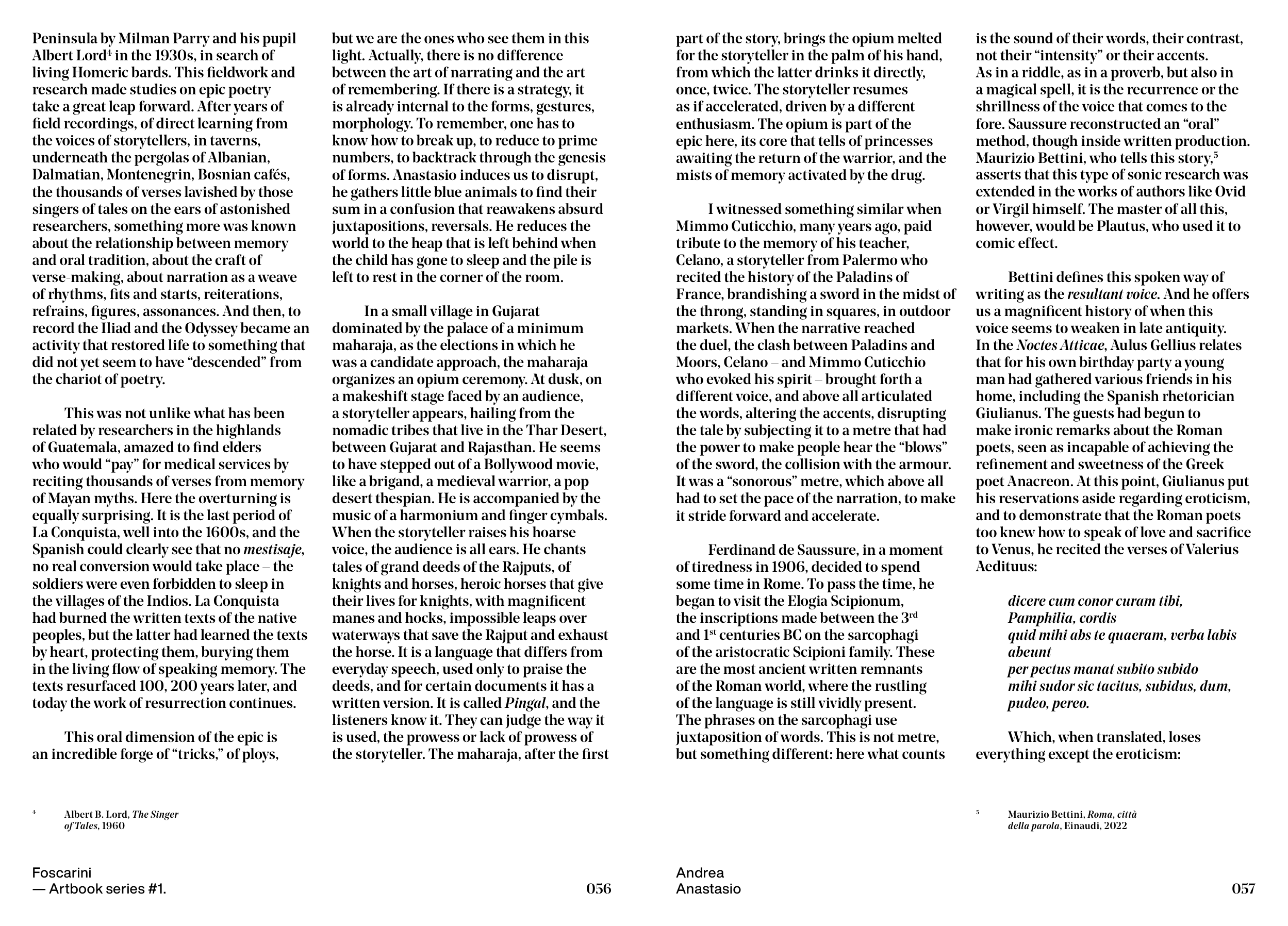Foscarini
— Artbook series #1.
Andrea
Anastasio
056
057
Peninsula by Milman Parry and his pupil
Albert Lord4 in the 1930s, in search of
living Homeric bards. This fieldwork and
research made studies on epic poetry
take a great leap forward. After years of
field recordings, of direct learning from
the voices of storytellers, in taverns,
underneath the pergolas of Albanian,
Dalmatian, Montenegrin, Bosnian cafés,
the thousands of verses lavished by those
singers of tales on the ears of astonished
researchers, something more was known
about the relationship between memory
and oral tradition, about the craft of
verse-making, about narration as a weave
of rhythms, fits and starts, reiterations,
refrains, figures, assonances. And then, to
record the Iliad and the Odyssey became an
activity that restored life to something that
did not yet seem to have “descended” from
the chariot of poetry.
This was not unlike what has been
related by researchers in the highlands
of Guatemala, amazed to find elders
who would “pay” for medical services by
reciting thousands of verses from memory
of Mayan myths. Here the overturning is
equally surprising. It is the last period of
La Conquista, well into the 1600s, and the
Spanish could clearly see that no mestisaje,
no real conversion would take place – the
soldiers were even forbidden to sleep in
the villages of the Indios. La Conquista
had burned the written texts of the native
peoples, but the latter had learned the texts
by heart, protecting them, burying them
in the living flow of speaking memory. The
texts resurfaced 100, 200 years later, and
today the work of resurrection continues.
This oral dimension of the epic is
an incredible forge of “tricks,” of ploys,
part of the story, brings the opium melted
for the storyteller in the palm of his hand,
from which the latter drinks it directly,
once, twice. The storyteller resumes
as if accelerated, driven by a different
enthusiasm. The opium is part of the
epic here, its core that tells of princesses
awaiting the return of the warrior, and the
mists of memory activated by the drug.
I witnessed something similar when
Mimmo Cuticchio, many years ago, paid
tribute to the memory of his teacher,
Celano, a storyteller from Palermo who
recited the history of the Paladins of
France, brandishing a sword in the midst of
the throng, standing in squares, in outdoor
markets. When the narrative reached
the duel, the clash between Paladins and
Moors, Celano – and Mimmo Cuticchio
who evoked his spirit – brought forth a
different voice, and above all articulated
the words, altering the accents, disrupting
the tale by subjecting it to a metre that had
the power to make people hear the “blows”
of the sword, the collision with the armour.
It was a “sonorous” metre, which above all
had to set the pace of the narration, to make
it stride forward and accelerate.
Ferdinand de Saussure, in a moment
of tiredness in 1906, decided to spend
some time in Rome. To pass the time, he
began to visit the Elogia Scipionum,
the inscriptions made between the 3rd
and 1st centuries BC on the sarcophagi
of the aristocratic Scipioni family. These
are the most ancient written remnants
of the Roman world, where the rustling
of the language is still vividly present.
The phrases on the sarcophagi use
juxtaposition of words. This is not metre,
but something different: here what counts
but we are the ones who see them in this
light. Actually, there is no difference
between the art of narrating and the art
of remembering. If there is a strategy, it
is already internal to the forms, gestures,
morphology. To remember, one has to
know how to break up, to reduce to prime
numbers, to backtrack through the genesis
of forms. Anastasio induces us to disrupt,
he gathers little blue animals to find their
sum in a confusion that reawakens absurd
juxtapositions, reversals. He reduces the
world to the heap that is left behind when
the child has gone to sleep and the pile is
left to rest in the corner of the room.
In a small village in Gujarat
dominated by the palace of a minimum
maharaja, as the elections in which he
was a candidate approach, the maharaja
organizes an opium ceremony. At dusk, on
a makeshift stage faced by an audience,
a storyteller appears, hailing from the
nomadic tribes that live in the Thar Desert,
between Gujarat and Rajasthan. He seems
to have stepped out of a Bollywood movie,
like a brigand, a medieval warrior, a pop
desert thespian. He is accompanied by the
music of a harmonium and finger cymbals.
When the storyteller raises his hoarse
voice, the audience is all ears. He chants
tales of grand deeds of the Rajputs, of
knights and horses, heroic horses that give
their lives for knights, with magnificent
manes and hocks, impossible leaps over
waterways that save the Rajput and exhaust
the horse. It is a language that differs from
everyday speech, used only to praise the
deeds, and for certain documents it has a
written version. It is called Pingal, and the
listeners know it. They can judge the way it
is used, the prowess or lack of prowess of
the storyteller. The maharaja, after the first
is the sound of their words, their contrast,
not their “intensity” or their accents.
As in a riddle, as in a proverb, but also in
a magical spell, it is the recurrence or the
shrillness of the voice that comes to the
fore. Saussure reconstructed an “oral”
method, though inside written production.
Maurizio Bettini, who tells this story,5
asserts that this type of sonic research was
extended in the works of authors like Ovid
or Virgil himself. The master of all this,
however, would be Plautus, who used it to
comic effect.
Bettini defines this spoken way of
writing as the resultant voice. And he offers
us a magnificent history of when this
voice seems to weaken in late antiquity.
In the Noctes Atticae, Aulus Gellius relates
that for his own birthday party a young
man had gathered various friends in his
home, including the Spanish rhetorician
Giulianus. The guests had begun to
make ironic remarks about the Roman
poets, seen as incapable of achieving the
refinement and sweetness of the Greek
poet Anacreon. At this point, Giulianus put
his reservations aside regarding eroticism,
and to demonstrate that the Roman poets
too knew how to speak of love and sacrifice
to Venus, he recited the verses of Valerius
Aedituus:
dicere cum conor curam tibi,
Pamphilia, cordis
quid mihi abs te quaeram, verba labis
abeunt
per pectus manat subito subido
mihi sudor sic tacitus, subidus, dum,
pudeo, pereo.
Which, when translated, loses
everything except the eroticism:
4
Albert B. Lord, The Singer
of Tales, 1960
5
Maurizio Bettini, Roma, città
della parola, Einaudi, 2022






